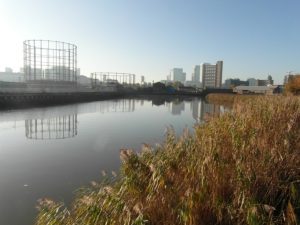In 2010 Thames 21 visited the Cody Dock Reedbed, close to the mouth of the River Lea (UK), it was instantly clear what a wonderful place it was and how damaged it had become. In amongst the reeds it was beautiful and peaceful, but it was calf-deep in rubbish and Japanese Knotweed had grown across the reedbed, eating out its heart.
As part of the Love the Lea campaign, Thames 21 commissioned a study into the use of reedbeds along the Lee (or Lea) Navigation to improve water quality, boost the biodiversity value of the area and improve green space.

The independent report, funded by the Environment Agency, reveals huge potential for reedbeds on the river to boost biodiversity, reduce the effects of pollution and improve the area for social and amenity value within the lower Lee* Catchment. Reedbeds are regarded as one of the most important ecosystems on earth and are sometimes referred to as ‘the kidney of the landscape’ for their important role in filtering pollutants and maintaining fresh water health.